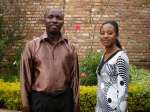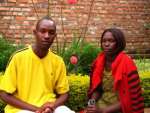Uwamwezi Philomene & Dusabe Nicole
Uwamwezi Philomene talks to Nicole about the difficulties parents face when talking to their children, and how people today can manage busy schedules to remember the past. Dusabe Nicole also wonders about how they can regain trust and love in society when certain people are known to have been murderers, and Uwamwezi Philomene counsels her in love.
Wherny Namara & Uwizeyimana Consolatrice
Through conversation, Consolatrice is able to find peace and strengthen her relationship with members of the community. Wherny helps her understand that hatred will not be helpful for the future of Rwanda.
"I developed a sense of love, the love of my enemies. I felt like I'm obliged, I felt like I have to pray for even those who hate me according to the story we shared." Uwizeyimana Consolatrice
Nyirahabimana Consolee & Mukeshimana Godelive
Nyirahabimana Consolee tells Mukeshimana Godelive stories about the way young girls acted before she was born, drawing on her own life and the stories her aunts told her. They include everything from weaving, the to difficulties with accepting advice, dealing with mothers-in-law, giving birth, changing traditions about co-wives, and much more.
"I can’t confirm that all the poor take a wrong way which will cause them more pain because of poverty. So even the poor can keep their dignities in their poverty and finally get their own families." Nyirahabimana Consolee
Uwamariya Victoire & Kabuto Noah
Kabuto Noah is curious about the trauma he witnesses in children who are not old enough to remember or have experienced the genocide, but have been affected by it nonetheless. Uwamariya Victoire tells him about the ways the genocide changed how lives are experienced, complicating everything from family structure to education. Most importantly, Kabuto Noah and Uwamariya Victoire discuss the ways that fear, anger, and sadness are best handled.
Umamwezi Philomene & Masengesho Rosine
Both Masengesho Rosine and her grandmother have experienced the hardships that women faced, the genocide, and life as orphans. But have never before spoken to one another about their lives. Umamwezi Philomene acknowledges the hurt and suffering women in particular have struggled with in Rwandan history, but sees a bright future for Masengesho Rosine through her youth and educational opportunities. Most importantly, she reminds her that all Rwandans should stand together for justice and peace, and being an orphan does not mean you cannot find a parent to advise you in times of need.
Umazikungu Beatrice & Gashumba Yves Fabrice
Although Gashumba Yves Fabrice and longs for a peaceful future, he still has a hard time forgiving those involved in the genocide and fears the resurgence of conflict. His friend Umazikungu Beatrice reminds him that kindness toward everyone is the best way to prove that Rwanda can move forward, and it is better to be remembered for acts of kindness rather than the brief satisfaction of taking revenge and being remembered for evil.
Mukakayange Veronique & Muyisenge Onaan
Muyisenge Onaan wants to learn about his family history and the stories his parents passed down to his older sister, Mukakayange Veronique. Mukakayange Veronique recalls the loss of their mother in a violent bombing, finding a way to build a relationship through song, and forgiveness. By discussing the manner in which they personally survived hardship, Muyisenge Onaan and Mukakayange Veronique imagine solutions for a peaceful future for Rwanda.
"There is a proverb in Kinyarwanda which says 'A good neighbor is better than a distant relative'." Mukakayange Veronique
Umuraza Nassim & Isimbi Tresor
Because he seems older than his years and keeps asking her, Umuraza Nassim, a poet and peacemaker, finally decides to tell her son, Isimbi Tresor, the truth about what happened to his grandparents during the genocide. These memories were so painful and identities of the killers still remain unknown, so she has been unable to talk to her son about her family’s history until now. In telling her story, Umuraza Nassim describes the hardships that she went through during and after the genocide, and also explains the fate of Tutsis and the events leading up to the genocide.
Mukansanze Imfura Chantal & Turatsinze Jimmy
Mukansanze Imfura Chantal explains to Turatsinze Jimmy how he became an orphan and how he got to where he is today. She urges him to continue his education and, equally importantly, to treat everyone as equals, regardless of ethnicity, wealth, or status, not only for himself, but for the future of the country. Turatsinze Jimmy describes his hazy memories as a young boy about the origins of genocide—why did a plane crash start a war? Was there already a plan in place to start the killing? Has there always been a rift between ethnicities?
Bankundiye Albertine & Nyinawumuntu Violette
With a focus on the importance of kindness and acceptance, Bankundiye Albertine tells her friend Nyinawumuntu Violette about her family’s past. She talks about her father, an educated man who was killed in the genocide, who would take children off the streets and help them get into schools. His good deeds and reputation inform Bankundiye Albertine’s actions and continue to keep her safe. She also mentions her challenges with her mother’s side of the family. Nyinawumuntu Violette offers consolation and advises Bankundiye Albertine to be loving towards her family and they will love her back.












